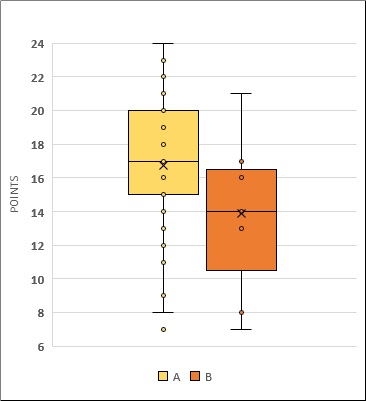Explore our preliminary findings based on submitted dilemma votes and completed surveys.
Displayed findings show at least a weak correlation (>0.2), are based on a decent sample size (50 overlapping entries), and have less than a 5% chance of being false positives. These will be updated, and more will be included as more data comes in. By using the application, you are taking part in empirical bioethics research.
You can find the survey section in the lesson menu. Please fill out each survey and complete the lesson before viewing related findings; this way you get more value as a user, and the quality of our data is preserved. If you come up with an explanation that may help to interpret any one of these findings, please let us know.
Skip to a dilemma or open a survey:
Informed Consent
Dilemma 3
Show complete description
A parent brings a child to the doctor for a cut that requires stitches. The doctor will not stitch the cut until the parent agrees to a tetanus shot. The parents begrudgingly approve. Is the consent voluntary given the type of inducement the doctor uses?
Your answer is:
Users who have received higher scores on the Existential Quest survey are more likely to select option A and so agree that the consent is voluntary.
Show my survey score
The midpoint (median) of the score distribution is 32 points. If your score is significantly higher or lower, this finding may apply to you.
Does a connection between dilemma answers and the openness to change one’s worldview make sense? Does it make moral sense that this tendency is influencing our ethical decision-making?
There is a ~5% chance of this finding being a false-positive (May 28, 2023).
Self-Experimentation
Dilemma 1
Show complete description
One noticeable hindrance for self-experimenters conducting scientific research has been the challenge of whether and how to report the results from their experiments so that the obtained – and at times personally expensive – scientific insights would in fact bear benefit.
It is difficult to predict if institutional recognition would serve to incentivize more undue risk-taking and increase the prevalence of biased science. If instead universities and scientific journals would uniformly require ethics committee approval, could ‘rogue’ scientists be deterred and disincentivized?
Attempts to provide support or oversight could result in legal challenges and institutional liability in cases of serious harm. Self-experimentations conducted this century are largely undocumented in the scientific literature, based on the shared experiences of the surveyed practitioners.
Without a high likelihood that the pursued benefit can actualize, the ethically important harm-benefit ratio is negatively affected. Decreasing the odds of successful publication might therefore shift the overall outcome of a risky experiment towards greater harm as unpublished data decreases the potential for social good. However, alternative unregulated publishing channels are already emerging.
Should results from a self-experimentation leading to a death of a researcher be published if they carry scientific value?
Your answer is:
Users who have received higher scores on the Need for Cognition survey are more likely to select option A for publishing the research.
Show my survey score
The midpoint (median) of the score distribution is 17 points. If your score is significantly higher or lower, this finding may apply to you.
Does a connection between dilemma answers and the tendency to engage in effortful thinking make sense? Does it make moral sense that this tendency is influencing our ethical decision-making?
There is a ~3% chance of this finding being a false-positive (Nov 28, 2023).
Animal Ethics
Dilemma 2
Show complete description
In many countries, safety testing with animals is no longer deemed necessary for specific cosmetics but is still used for chemicals found in these products. This dilemma is about a new chemical ingredient that is not expected to cause severe harm. Yet, all animal subjects are killed afterwards so that their tissues can be examined. A risk for a more serious reaction of course exists – which is the reason and justification for the toxicology experiment. Specially bred hairless laboratory mice are used because they best mimic human skin. The studied ingredient has some available alternatives but it could lower manufacturing costs for many chemical cosmetics, supplements, or even pharmaceuticals.
Assuming there are no feasible alternatives to animal testing, would you still vote to prevent the experiment? Or is optimising the safe manufacture of everyday products by the chemical industry worth these mammalian lives?
Your answer is:
Users who have received higher scores on the Nature Relatedness survey are more likely to …
Show my survey score
The midpoint (median) of the score distribution is 16 points. If your score is significantly higher or lower, this finding may apply to you.
Does a connection between dilemma answers and the tendency to engage in effortful thinking make sense? Does it make moral sense that this tendency is influencing our ethical decision-making?
There is a ~3% chance of this finding being a false-positive (Nov 28, 2023).

